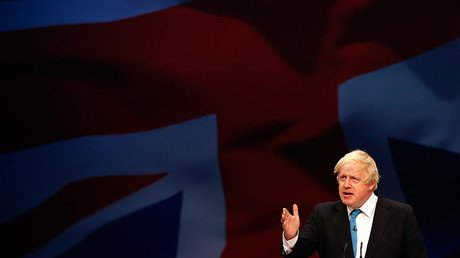Last refuge of political scoundrels: 'The Russians did it' excuse

Any third-rate politician who fails anywhere to explain away his failures now has a very convenient scapegoat, says George Szamuely, from the Global Policy Institute at London Metropolitan University.
The UK has no evidence Moscow is trying to undermine the democratic process in Britain, according to the UK Foreign Secretary Boris Johnson. However, Johnson did comment that the Kremlin has the ability to interfere in Britain's affairs if it chooses to do so.
Russian hacking claims, which started in the US with unsubstantiated accusations that Moscow hacked the Democratic National Committee and interfered in the presidential elections, has now moved overseas.
RT: Is it fair to continue making accusations about Russian meddling in other countries' political processes without providing any evidence?
George Szamuely: I don’t think it is fair exactly, but ‘the Russians did it’ mantra is now the last refuge of a scoundrel. Any third-rate politician who fails anywhere can now point to the Russians or the malign influence of RT to explain away his failures. This little trick, now all politicians have battened on to it, started in the US, but now the Europeans have also battened on to it. It is nonsensical. And Boris Johnson of all people looks particularly foolish when he starts talking about this Russian interference in elections because one of the accusations made against the Russians was over Brexit. Since he was one of the leaders of the Brexit movement, I don’t think he is in a good position to then say “Well, it was all the Russians’ fault that Brexit passed.
RT: Why is Russia still being presented as a major threat?
GS: I think it has been part of the Western policy for decades, ever since the end of the Cold War that the Western powers seized on the dissolution of the Soviet Union and the momentary weakness of the Russians for a few years during the 1990s. The West seized on that moment to expand its power and influence as much as it could without thinking through that at some point Russia will recover. When Russia does recover, it will be very pissed off at seeing Western powers on its borders because it will see it as a legitimate and a very serious threat to its security, and the Western powers didn’t see it through. And now they are absolutely apoplectic at the fact that the Russians are making very legitimate points about the threat to their national borders.
RT: The media seems to take these allegations about Russia at face value. Isn't that a concern?
GS: Of course it is a big concern. And the amazing feature of all of this is that the media has not seriously considered the evidence for any of these ridiculous claims. They keep repeating about these seventeen intelligence agencies who have found without any dispute the Russians interfered in the 2016 presidential election. But they don’t present any evidence. Anybody can say “the Russians did it and we have all the evidence, but we're not going to show it to you.” Where is the evidence? And James R. Clapper, the director of National Intelligence under Obama, he first made the accusation against the Russians in October of last year. Three months later, the intelligence agencies came out with this report that offered nothing, not one scrap of evidence. Half of it was a warmed over report about RT that was written in 2012. That is the sum and substance of their case against the Russians.
The CIA is one the most sophisticated in the world, the technology is very sophisticated. But the latest WikiLeaks revealed it is porous. It can be hacked into. And others could do that. And the CIA, the American Intelligence community, does not protect its own secrets, does not protect itself very well. So, therefore, they can, in fact, attempt to penetrate other countries as well and they do because that is their business. But it is very difficult for them to say, “it is Russia, it is the fault of Russia” because the evidence obviously isn’t there because the technology is so sophisticated now, that is virtually impossible to identify the source. They only can say, for political reasons, that it is Russia. - Martin McCauley, author, and Russia analyst
RT: We've now heard the CIA is essentially able to frame other states for cyber-attacks. Doesn't this further cast doubt on the allegations about Russia?
GS: Of course, it does. And that is what is so interesting about the revelations earlier this week from WikiLeaks that the CIA makes it a practice of creating an archive of previous hacks so that they can conceal their own hacks by imposing the fingerprints if hacks made by others. So, in fact, it could well have been CIA hacking to the DNC which was made to look as if it were Russians. And in fact, it was always a kind of common sense that if the Russian state were behind the hack of the DNC, then they would make very sure that they wouldn’t leave any fingerprints or any traces that could be traced to their activities. That would just be common-sensical, but instead, CrowdStrike which was this strange little organization that claims to be experts on cyber-attacks found with almost no investigation “We definitely have this conclusive proof that the Russians were behind it.” And then the CIA simply adopted the claims of CrowdStrike. But CrowdStrike just came to this conclusion with really no serious investigation.
The statements, views and opinions expressed in this column are solely those of the author and do not necessarily represent those of RT.













